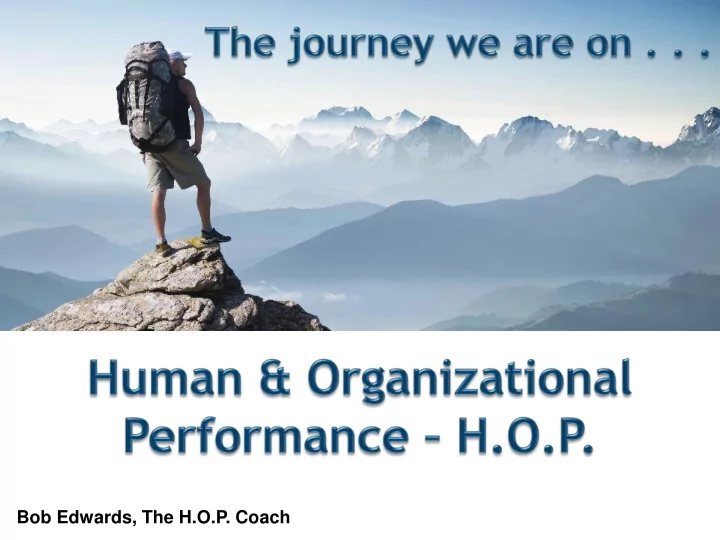

Bob Edwards, The H.O.P. Coach
1 st Industrial Revolution
Industry 4.0
The problem with AND? Efficiency Thoroughness Trade Off (Hollnagel)
We want our organizations and operations to become more . . . Reliable and Resilient !
We have to move beyond – Blame and Punish? Even beyond Error Prevention? To Error Tolerant systems?
“Fundamentally, people come to work to do what? Good work!“
Waldorf & Statler
We need to answer the question . . . Do we want retribution? or Do we want restoration?
We can blame and punish? or learn and improve? But we can’t do both!
“...blame is the enemy of understanding.” (Andrew Hopkins)
Our Basic Principles 1. Error is Normal 2. Blame Fixes Nothing 3. Context Drives Behavior 4. Learning & Improving is Vital 5. Response Matters
Our Goal . . . . . . is to become less surprised by human error and failure . . . . . . and instead, become a lot more interested in and a lot better at operational learning!
Work as Planned vs. Work in Practice Normally Successful! “Masters of the blue line” (Conklin / Edwards)
3 Parts of an Event (Conklin)
3 Parts of an Event The Challenge: Not to let post-event hindsight bias our judgment of the pre-event context. (Conklin)
“Underneath every seemingly obvious, simple story of error, there is a second deeper story. A more complicated story . . . a story about the system in which people work.” (Dekker, 2006)
Some tools lead us to a linear understanding of the event . . . . . . which may be enough Root Event 5 4 3 1 2 Cause? The problem is, many failures are not linear . . . . . . and there may not be a single actual root cause. (Contributions from Ryan Ward and Tanya Lughermo)
Start back in process . . . . . . move towards the event. Weak Signals Production pressure Unclear Signals Adaptation Fear of reporting Latent Conditions System Strengths System Weaknesses Errors Resource constraints Hazards & Risks Surprises Event Success Local Factors Flawed processes Personal Factors Incomplete Procedures Normal Variability Change in plans Near Misses No Surprise! Past Success Data Design shortcomings Poor communication Goal Conflict Tradeoffs (Conklin/Baker/Edwards/Howe and more)
If we want better answers . . . we have to ask better questions! (Conklin)
Expand the question from “why?” . . . . . . to “how?” (Conklin)
Great performance is not the absence of errors or failures. . . . . . it’s the presence of capacity . (Conklin, 2012)
When we believe we know the answer . . . . . . we stop asking questions . . . we stop listening . . . we stop learning!
The power to ask the right questions . . . . . . comes from acknowledging that you don’t know the right answer.
The worker is not the problem to be solved . . . . . . the worker is the problem solver.
Nevada military depot mortar explosion kills seven Marines Paul Szoldra, 9:16 a.m. Mar 19, 2013 Marines: Human error to blame for (Reuters) - A mortar explosion at a U.S. deadly blast in Nevada Army munitions depot in Nevada killed seven Marines from Camp Lejeune, North Jim Michaels, USA TODAY12:34 p.m. EDT May 29, 2013 Carolina, and injured seven other service A training accident in Nevada that killed members during a live-fire training seven Marines during a live fire exercise exercise, military officials said on Tuesday. earlier this year was caused by "human (March 18, 2013) error," the Marines said in a statement Wednesday.
“I have never been especially impressed by the heroics of people convinced they are about to change the world. I am more awed by those who struggle to make one small difference.” (Ellen Goodman)
Resources Chris Clearfield Todd Conklin, PhD Jerry Muller Sidney Dekker, PhD Weick & Sutcliffe Edgar Schein, PhD Bob Edwards / hop_coach@outlook.com / 423.280.8217
Recommend
More recommend